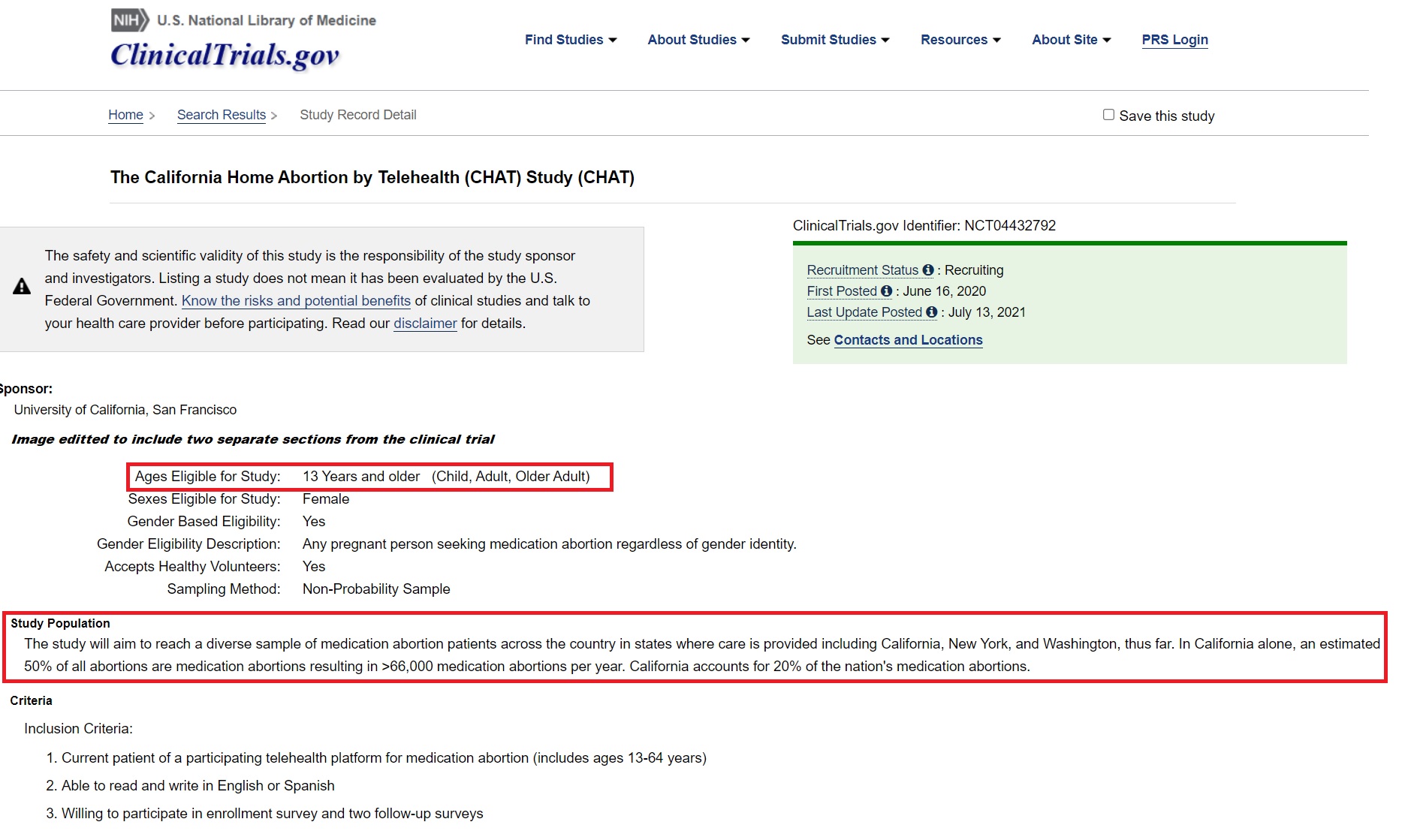 Nearly 70,000 chemical abortions are committed annually in California (50% of all abortions committed in the state), according to a study sponsored by the University of California San Francisco (UCSF), which trains abortion providers through its Bixby Center for Global Reproductive Health. The information comes from a clinical trial sponsored by UCSF called the CHAT Study, which stands for California Home Abortion by Telehealth.
Nearly 70,000 chemical abortions are committed annually in California (50% of all abortions committed in the state), according to a study sponsored by the University of California San Francisco (UCSF), which trains abortion providers through its Bixby Center for Global Reproductive Health. The information comes from a clinical trial sponsored by UCSF called the CHAT Study, which stands for California Home Abortion by Telehealth.
“CHAT is the first study of its kind in the U.S. that will evaluate abortion medication by mail without the need for a doctor’s visit or ultrasound,” a fundraising page for the study states.
UCSF wrote about the trial, “The study will aim to reach a diverse sample of medication abortion patients across the country in states where care is provided including California, New York, and Washington, thus far. In California alone, an estimated 50% of all abortions are medication abortions resulting in >66,000 medication abortions per year. California accounts for 20% of the nation’s medication abortions.” (emphasis added)
California is not required to report abortions in the state and these numbers are therefore not factored into data published by the Centers for Disease Control and Prevention (CDC), which recently noted that chemical abortions comprised nearly 44% (43.7%, to be exact) of abortions reported to the CDC in 2019.

UCSF abortion pill study 66K chemical abortions in California a year recruits girls as young as 13
California has vowed to be a sanctuary for abortion and recently formed the California Future of Abortion Council initiative. In 2019, Live Action News reviewed reports published by Medi-Cal, a California state taxpayer-funded program for low-income children and adults, and found that in just the state’s Fee for Service (FFS) Program, taxpayers paid nearly $700 million for abortions over 25 years, from 1989 to 2014.
California Home Abortion by Telehealth (CHAT) Study
The CHAT study, which it is expected to be completed in October of this year, aims to “assess efficacy and safety outcomes of a telehealth model of abortion care,” and “will compare efficacy of this model to usual in-clinic care based on published rates. It will also investigate participant acceptability and feasibility of this model of care.”
The CHAT study is sponsored by UCSF and is being overseen by Ushma Upadhyay and Jennifer Ko. It is recruiting “females ages 13 years and up.” Upadhyay is an Associate Professor at UCSF’s Advancing New Standards in Reproductive Health (ANSIRH). ANSIRH is part of UCSF’s Bixby Center for Global Reproductive Health. In 2019, well before the COVID-19 pandemic, Upadhyay advocated a “no test/no touch” approach where she and her colleagues suggested that abortion providers should simply “believe the woman” about the exact dating of her pregnancy.
“We will examine medical chart data on all patients from partnered telehealth providers to analyze efficacy and safety outcomes for medication abortion. These medical chart data will include medical/pregnancy history and abortion outcome and de-identified apart from date of birth, zip code, and dates of service,” the sponsors wrote on the trial website.
Then, each telabortion client will receive an optional survey “following completion of the telehealth provider’s standard medical screening.”
The study sponsor claims, “Among those who complete the study surveys, we will investigate the feasibility, time to abortion, efficacy, safety, and acceptability of telehealth provision of mifepristone, measured using a 4-week follow-up though open-ended and closed-ended survey questions. Individuals who opted not to take the medications will be asked a separate set of follow-up questions to collect data related to diversion, to better understand potential risks.”
“With the recent announcement that the FDA is planning to review the REMS requirement, we are at a pivotal moment for the future of abortion care and reproductive autonomy…” Upadhyay previously wrote. “On May 1st 2021, clinical data collection to assess the safety and efficacy of telehealth abortion care commenced. This is the data that the FDA is interested in. We’ll be able to get it in front of them.”
UCSF partners with virtual chemical abortion pill Choix
UCSF is partnering with multiple virtual abortion pill dispensaries to recruit teens and women for their CHAT study, including Choix Inc., HeyJane, and virtual abortion pill website Abortion on Demand (AOD).
Study: California commits 20% of nation’s total chemical abortions
Study: California commits 20% of nation’s total chemical abortions (liveaction.org)
Study: California commits 20% of nation’s total chemical abortions
“CHAT is the first study of its kind in the U.S. that will evaluate abortion medication by mail without the need for a doctor’s visit or ultrasound,” a fundraising page for the study states.
UCSF wrote about the trial, “The study will aim to reach a diverse sample of medication abortion patients across the country in states where care is provided including California, New York, and Washington, thus far. In California alone, an estimated 50% of all abortions are medication abortions resulting in >66,000 medication abortions per year. California accounts for 20% of the nation’s medication abortions.” (emphasis added)
California is not required to report abortions in the state and these numbers are therefore not factored into data published by the Centers for Disease Control and Prevention (CDC), which recently noted that chemical abortions comprised nearly 44% (43.7%, to be exact) of abortions reported to the CDC in 2019.
UCSF abortion pill study 66K chemical abortions in California a year recruits girls as young as 13
California has vowed to be a sanctuary for abortion and recently formed the California Future of Abortion Council initiative. In 2019, Live Action News reviewed reports published by Medi-Cal, a California state taxpayer-funded program for low-income children and adults, and found that in just the state’s Fee for Service (FFS) Program, taxpayers paid nearly $700 million for abortions over 25 years, from 1989 to 2014.
California Home Abortion by Telehealth (CHAT) Study
The CHAT study, which it is expected to be completed in October of this year, aims to “assess efficacy and safety outcomes of a telehealth model of abortion care,” and “will compare efficacy of this model to usual in-clinic care based on published rates. It will also investigate participant acceptability and feasibility of this model of care.”
The CHAT study is sponsored by UCSF and is being overseen by Ushma Upadhyay and Jennifer Ko. It is recruiting “females ages 13 years and up.” Upadhyay is an Associate Professor at UCSF’s Advancing New Standards in Reproductive Health (ANSIRH). ANSIRH is part of UCSF’s Bixby Center for Global Reproductive Health. In 2019, well before the COVID-19 pandemic, Upadhyay advocated a “no test/no touch” approach where she and her colleagues suggested that abortion providers should simply “believe the woman” about the exact dating of her pregnancy.
“We will examine medical chart data on all patients from partnered telehealth providers to analyze efficacy and safety outcomes for medication abortion. These medical chart data will include medical/pregnancy history and abortion outcome and de-identified apart from date of birth, zip code, and dates of service,” the sponsors wrote on the trial website.
Then, each telabortion client will receive an optional survey “following completion of the telehealth provider’s standard medical screening.”
The study sponsor claims, “Among those who complete the study surveys, we will investigate the feasibility, time to abortion, efficacy, safety, and acceptability of telehealth provision of mifepristone, measured using a 4-week follow-up though open-ended and closed-ended survey questions. Individuals who opted not to take the medications will be asked a separate set of follow-up questions to collect data related to diversion, to better understand potential risks.”
“With the recent announcement that the FDA is planning to review the REMS requirement, we are at a pivotal moment for the future of abortion care and reproductive autonomy…” Upadhyay previously wrote. “On May 1st 2021, clinical data collection to assess the safety and efficacy of telehealth abortion care commenced. This is the data that the FDA is interested in. We’ll be able to get it in front of them.”
UCSF partners with virtual chemical abortion pill Choix
UCSF is partnering with multiple virtual abortion pill dispensaries to recruit teens and women for their CHAT study, including Choix Inc., HeyJane, and virtual abortion pill website Abortion on Demand (AOD).
This entry was posted on Thursday, January 27th, 2022 at 10:36 am and is filed under News & Commentary. You can follow any responses to this entry through the RSS 2.0 feed. You can skip to the end and leave a response. Pinging is currently not allowed.